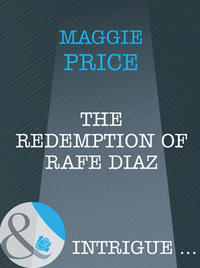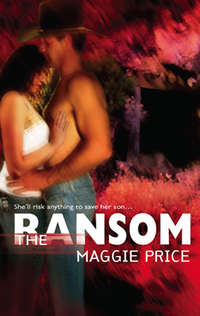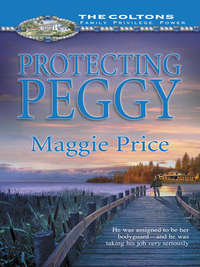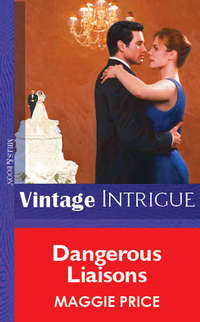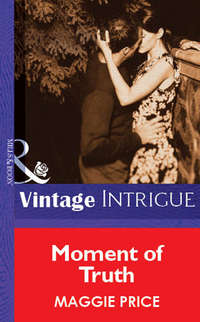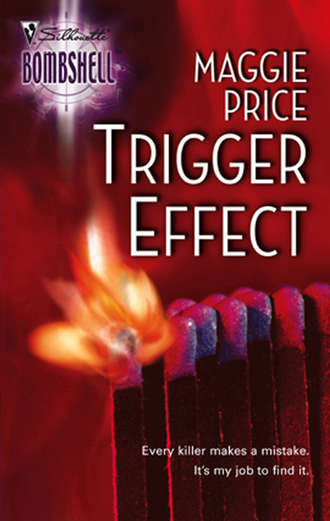
Полная версия
Trigger Effect

“I’m waiting for the punch line, Carmichael.” McCall crossed his arms over his chest.
“He mentioned that later in the day they drove to the restaurant. Then they drove to the store, then drove home. Drove. He habitually uses that verb when he’s with someone. That morning, he drove to the perfect place. Then went for a drive in the country. His change in verbiage indicates a change in reality. He was with someone, later he was alone. Who was he with and what happened to them?”
McCall took a step toward her. “Carmichael, you’re off base accusing an officer of a heinous crime because of the verbs he used.”
“I don’t think so.” Paige angled her chin. “Earlier this evening you told me you buy into statement analysis one hundred percent.”
He moved toward her, his face tense in the harsh fluorescent light. “This skill of yours has merit when it comes to criminals. They deserve having every word uttered put under a microscope for you to pick apart. That’s your job.”
“And I’m damn good at it,” Paige said firmly.
“Ever think you might be too damn good?”
Trigger Effect
Maggie Price

www.millsandboon.co.uk
MAGGIE PRICE
is no stranger to law enforcement. While on the job as a civilian crime analyst for the Oklahoma City Police Department, she analyzed robberies and sex crimes and snagged numerous special assignments to homicide task forces.
While at OCPD, Maggie stored up enough tales of intrigue, murder and mayhem to keep her at the keyboard for years. The first of those tales won the Romance Writers of America’s Golden Heart Award for Romantic Suspense. Maggie is also the recipient of Romantic Times’ Career Achievement Award in series romantic suspense.
Maggie invites her readers to contact her at 416 N. W. 8th St., Oklahoma City, OK 73102-2604, or on the Web at www.maggieprice.net.
To my former coworkers at the Oklahoma City Police Department for acting as my guide into the fascinating world of homicide investigation and forensic statement analysis. If longtime pals are truly gold, you guys are twenty-four karat.
Contents
Chapter 1
Chapter 2
Chapter 3
Chapter 4
Chapter 5
Chapter 6
Chapter 7
Chapter 8
Chapter 9
Chapter 10
Chapter 11
Chapter 12
Chapter 13
Chapter 14
Chapter 15
Chapter 16
Chapter 17
Chapter 18
Chapter 19
Chapter 20
Chapter 21
Chapter 22
Chapter 23
Chapter 24
Chapter 1
The morning started off badly the instant Paige Carmichael woke in her hotel suite, flipped on the TV and heard the date. Just the reminder it was February tenth shifted her mood from half-asleep to sulky to totally ticked.
Offended and resentful soon jumped into the mix as things went downhill fast.
She burned her tongue on the coffee she brewed in the unit atop the minibar. While dressing, she snagged her only pair of panty hose. Dropped and lost the tiny back of her earring. Made two wrong turns in Oklahoma City’s maze of unfamiliar rush hour traffic.
When she finally nosed her rental car into a slot marked Guest Instructor at the police training center, she was fifteen minutes late for her workshop.
Grabbing her briefcase, Paige opened the car door and stepped into the February morning. Although sunlight beamed down, the temperature was icy and she shivered beneath her tan cashmere coat. Despite running late, she did a slow surveillance of the parking lot that was jammed like Easter Sunday.
Paige didn’t buy the cold, bright veneer of peace. Underlying it was a low hum of disquiet that skimmed along her nerves. Her sense of awareness had taken on an edge nearly two weeks ago when Edwin Isaac, the brilliant psychiatrist she’d taken down for murdering five prostitutes, killed a guard and escaped after a hearing at a Texas courthouse.
During his nearly year-long killing spree, the media had dubbed the killer “Gentleman Jim” because of the meek, soft-spoken facade he’d used when approaching his prey. After his capture, Isaac’s polite demeanor hadn’t faltered, even while eerily promising Paige they would see each other again.
Isaac had been as good as his word. After his escape, he’d left a message on her cell phone’s voice mail, reminding her of that promise.
Since then, nothing.
Her early-warning system told her she was the only person lurking in the parking lot, so she hustled into the building. During her drive there she’d called the training center and alerted the secretary that she’d be late. Paige asked the woman to distribute the manuals shipped there by her employer, the Lassiter Group, a security and investigations firm. She’d also gotten the location of her classroom.
The clicking sound of her spiky red suede heels pierced the silence like gunshots as she rushed along the tiled hallway, shifting her purse and briefcase between hands while she tugged off her coat. After her crummy morning, she’d resolved once more to take what had happened three years ago in stride.
Her renewed resolve lasted only until she opened the door to her classroom, its seating done in auditorium-style with tables facing the far wall. Her gaze sliding over the awaiting workshop attendees, she dashed inside and stumbled over the outstretched legs of a lanky man seated at the table nearest the door.
“Careful,” he said. The only thing that kept her from falling on her face was the hand he’d locked on her elbow.
“Sorry,” she managed when she got her balance back. Smoothing her skirt, Paige noted the gold badge clipped to his belt.
“I’m not,” he murmured. Easing his feet out of her way, he arched a dark brow and slowly shifted his gaze to her cherry-red jacket and slim skirt. He hitched up one corner of his mouth while he scoped out her legs as if memorizing them for a lineup.
Narrowing her eyes, Paige wrenched her elbow from his grip. The man leaned back in his chair, rested an ankle over one knee and grinned. He wore a dark suit, starched white dress shirt and a crimson tie. His hair was jet-black and his Mediterranean complexion only added to his looks.
Good-looking or not, he was an arrogant jerk, she thought as she strode past rows of occupied tables toward the front of the classroom. She knew exactly what type of man lay behind that pretty-boy face. Her reportedly sexy-as-hell rodeo-riding father had blown into Dallas like an ill wind and claimed her mother’s heart. The minute Sara Sue Carmichael breathed the word, “pregnant,” Daddy Dear saddled up and rode out of town, never to be heard from again.
Twenty years later, having learned zilch from her mother’s experience, Paige got hitched to her own bad-boy charmer. And three years ago today she had found out how wrong Mr. Right had been. Now, here she was, barely avoiding a face-plant over a cop with a shit-eating grin that brought her ex all too clearly to mind. Paige’s mood shot all the way to surly.
She settled her briefcase, purse and coat on the table beside the speaker’s podium. When she’d called ahead, she asked the secretary to have the mix of twenty-five cop and civilian investigator attendees fill out a seating chart with their name and agency. Paige saw the chart on the podium. Her gaze focused on the list of names on the back row. The shit-eating grin belonged to Sergeant Nate McCall, Oklahoma City PD Homicide.
She’d shown her tomcat husband no mercy, she thought with grim satisfaction. And she would bet the bank that during her three-day workshop she’d have the opportunity to use Sergeant Lothario’s own words to take him down a notch.
“Sorry I’m late,” she said, scanning the attendees. There were three men for every woman in the workshop; more commissioned law enforcement officers than civilians from local security firms.
As usual for the first day of a workshop, they were all sizing her up.
A few seemed to regard her with outright skepticism. The majority studied her through unreadable eyes. Having worn a badge for eight years, Paige knew that everyone—especially cynical, seen-it-all cops—would take tons of convincing before they bought into the idea that forensic statement analysis was a viable investigative technique.
Not a problem. She’d taught the subject for more than two years and she was up for the challenge.
She pulled a legal pad from her briefcase and announced, “I’m Paige Carmichael. Your manual lists my background information. I’ll fill in any blanks if you’ve got questions about my credentials.”
A burly man with gray at his temples and carrying the no-nonsense air of a veteran cop spoke up. “Why’d you quit the Dallas PD?”
Paige had been asked the question more times than she could count. As always, it settled a hard knot of regret inside her. In law enforcement circles, a huge difference existed between ex and retired cops. Retired cops had served their full time. Ex meant there was some reason a person didn’t have what it took to stay on the job.
“This is why.” Paige held up her right hand, exposing the scar that extended from her knuckles to her wrist. The scar looked smooth and shiny, like a latex snake, and stayed perpetually numb due to nerve damage. She’d considered—then discarded—the idea of having cosmetic surgery. Instead, she wore the scar as a reminder of the havoc a charming son of a bitch could wreak in a woman’s life.
“In the last homicide case I worked we had a string of five victims. All prostitutes. It took my partner and me nearly a year to zero in on a psychiatrist named Edwin Isaac. When we closed in on him, he squeezed off one shot before we took him down. That shot ended my ability to squeeze a trigger. A perpetual desk job wasn’t what I wanted, so I resigned.” Paige didn’t add that the bullet had also sent the dominoes tumbling, unearthing her husband’s betrayal and turning her life upside down.
“Tough way to lose your badge,” the older cop commented. “The good news is you nabbed the killer shrink.”
“The bad news is Isaac escaped two weeks ago, and is still on the lam.” Paige saw a few cops exchange alarmed looks. “Now that you know about me, it’s my turn to learn something about each of you.”
She stepped to the closest table and handed the pad to an attractive female cop with a heavy black braid looped over one shoulder. “Tear off one page and pass the pad along. I want each of you to write down everything you did yesterday, from the time you woke up to the time you went to bed.
“Don’t put your name on the page. You’ll turn it in anonymously.” She glanced at her watch, then retrieved a pen that had been left on the podium. “I have to check in at the commander’s office, so you’ve got half an hour to complete your assignment. And don’t think you can get by without turning one in.”
She retraced her steps along the center aisle. When she reached the back row of tables, she dropped her pen on purpose behind Nate McCall’s chair. Leaning down, she swept up the pen, pausing to zero in on his paper. It took only seconds for her to commit his handwriting to memory.
A half hour later, Paige was back at the podium, the assignment sheets stacked on the nearby table.
“Over the next few days you’ll learn to view statements by suspects, victims and witnesses in an entirely different way. This technique is hard for a lot of investigators to accept at first because you’re conditioned to believe a person with something to hide is going to lie.”
“Get a clue, lady,” the man sitting next to McCall said. “They do lie.”
The comment garnered a slew of laughs. Paige checked the seating chart for the name of the man who looked something akin to an Italian playboy. Hugh Henderson, OCPD Homicide. The jerk quotient for that particular division just rose.
“You’re right, Sergeant. If you back a guilty suspect into a corner and demand to know, ‘Did you kill the convenience store clerk?’ you’ll probably be told a lie. But since your job is to find out the truth, operating that way won’t help solve your case.
“Instead, have that same suspect write down what happened on the day the convenience store he was seen at got robbed. He’ll probably choose not to lie because doing so causes stress. Instead, he’ll tell you the truth, omitting anything that’s incriminating to get you to believe he’s innocent. The key to statement analysis is to pay attention to every word a person uses, and to believe what they tell you. Never assume someone is lying.”
Paige knew from experience she had to dish up solid proof if she hoped to start making converts.
“When you received your enrollment confirmation, you were asked to bring a statement from an actual case you’ve closed. Did you bring one, Sergeant Henderson?”
“My partner’s got it.” Henderson glanced at the affable-looking sandy-haired man sitting on his left. “You remember to bring it?”
“Yeah.” The toothpick stuck in the corner of the man’s mouth bobbed with the word. While he reached inside his sport coat, Paige checked her chart. Steve Kidd. He pulled out a piece of paper, passed it to a cop at the table in front of him.
Paige moved around the podium to take the paper. “Sergeant Kidd, give me a quick summary of who wrote this statement.”
“A guy called 911, claimed he got home from work and found his wife dead,” Kidd said around the toothpick. “This statement is all we got before he had an emotional breakdown and his doctor had to sedate him.”
Paige unfolded the paper. The statement was just ten lines. She read the statement, using a pencil to circle certain words, underline and connect others, and drew a box around specific ones.
When she finished her analysis, she said, “Again, I’m approaching this with the belief that the husband is telling the truth. I’ll read his statement out loud, then give you my take on what happened.”
“Sure thing,” Henderson said, then shot McCall a smug look. Paige noticed the look was wasted, since McCall was intensely focused on her.
Paige began to read.
“‘I came home. I noticed that the house is very quiet. I kept wondering where Mary was. I knew she had to be somewheres. I started trying to find her. I walked into her bedroom and there she was. All I could do is stand and wonder what to do now and finally decided to call 911 and tell them when I got home I found that someone had killed my wife. When you guys showed up you saw all the blood and everything in such a mess. Whoever killed her made her suffer, that is for sure.’”
Paige leaned an elbow on the podium. “In the first line the husband wrote ‘I came home.’ Later he told the police dispatcher that ‘I got home.’ It’s significant that the subject uses different verbs to describe the same activity.”
“How?” asked the female cop with the dark braid. “What difference does that make?”
Paige glanced at the seating chart. The woman’s name was Tia Alvarado, a sergeant in OCPD’s Vice detail. “We’re creatures of habit. When we do something alone, we habitually use one verb to describe a specific activity. But when someone is with us, we use a different verb when talking about that same activity. It’s an unconscious thing. So this shift in word usage can determine if there’s a change in the number of people present at any given time in a statement.”
Henderson shifted in his chair. “How does that tell you if our guy was alone or not?”
“In this case it doesn’t because his statement is so brief. If this were an open case, I would recommend that when you and Sergeant Kidd reinterview the husband, you ask him how he spent the day prior to his wife’s murder. Then the day before that, and so on. It would soon be clear which verb he habitually uses when he talks about being with Mary. And if every day he came home and found her alive, it would be a good bet she was still alive when he came home on the day she died.”
Paige studied her audience. A few were exchanging looks.
“The husband tells us he ‘noticed that the house is very quiet.’ He’s switched to present tense. That’s a red flag because there’s a good chance that part of the story isn’t coming from memory. That he’s making it up.”
People had begun jotting notes.
“The subject writes that he started trying to find his wife, yet he went straight to her bedroom where her body was. Her bedroom. Not sharing a bedroom is unusual for a husband and wife. I would want to ask him about his and Mary’s relationship.
“He then tells us ‘I finally decided to call 911.’ What’s to decide? He claims he came home and found his wife dead, so calling 911 should have been automatic. Could be he was wondering if he had let enough time go by to call the police.”
“Every word,” Alvarado said. “You do look at every word.”
Paige nodded. “A person gives him or herself away unconsciously because they’re focused on hiding information. Patterns can be detected if you know what to look for.”
She referred back to the statement. “In his third sentence the husband calls Mary by name. Later he refers to her only as ‘my wife’ and ‘her.’ He’s trying to depersonalize Mary.”
“Because by that point she’s dead?” someone asked.
“I’d say so. A depersonalization is common in homicide cases when one spouse murders the other.” Paige skimmed her gaze to the end of the statement. “The last sentence is the kicker. ‘Whoever killed her made her suffer, that is for sure.’ If I were working this case, I’d be sure to ask how he knows that.”
She shifted her gaze to Henderson and Kidd. Both had their eyes trained on her. “In my opinion,” she said, “the husband is as guilty as homemade sin. Is that how things turned out?”
“Man,” Henderson said, shaking his head. “Man, oh, man.”
“Yeah.” Kidd pulled the toothpick out of his mouth. Paige saw that it was a plastic one with a curve on one end that held a length of dental floss. “It took us a couple of days, but we got a confession out of him.” Kidd paused. “Did you read about this case in the papers, Ms. Carmichael?”
“I live in Dallas, Sergeant Kidd. Our media doesn’t cover most crimes that occur in Oklahoma.”
“Guess not.” He slid the toothpick into the inside pocket of his sport coat.
“Statement analysis can be used in areas other than criminal investigations.” Paige moved to the table beside the podium and picked up the stack of assignments. “Let’s take a look at one of these.” She fanned through the pages, spotted McCall’s handwriting, plucked out the sheet and began to read.
“‘I woke up, showered, shaved, got dressed, then drove across town and picked up a friend. We went to Nick’s for champagne brunch. We left Nick’s and drove to a movie. After the movie we stopped and had a drink. Then she and I went to a mall, did some shopping. Later I took her back to her condo. She unlocked the door, I turned on the lights. I went home not long after that. I worked on my car, watched TV, then read for a while.’”
Paige glanced up. Because several cops were sending knowing looks in McCall’s direction, she figured Nick’s must be a well-known hangout of his.
“I’m guessing this was written by a male since the author mentioned shaving and working on a car.” She met McCall’s gaze for an instant before looking back at the paper. “The author didn’t introduce his lady friend by name. The norm for healthy relationships is a clear introduction. For example, ‘My friend, Sally.’ But in tumultuous relationships, introductions often are missing. Still, there’s a sense of togetherness in that the author uses the word we in his initial description of his and his friend’s activities. We went to Nick’s, we left there, we drove to the movie, we stopped to have a drink.”
“Hey, McCall,” Henderson said, sending his coworker a leering look. “Just how much togetherness went on?”
Muted chuckles sounded while McCall shrugged, said nothing.
“A problem,” Paige continued, “or disagreement occurred between the time the author and his friend stopped to have a drink and went to the mall. I know that because he shifted his language from we to she and I. That change shows a distancing. This problem continued when he got to his friend’s condo. He was hoping to…” Paige paused. “Well, let’s just say, hope is all he did.”
“Holy—” Detective Alvarado flicked a slightly amused look over her shoulder at McCall before turning back to Paige. “How the heck can you tell when someone doesn’t score?”
“The author mentioned that when he and his friend arrived at her condo, he turned on the lights,” Paige replied.
“So?” Tia asked. “It must have been dark out.”
“And turning on the lights would be taken for granted. So, mentioning the activity indicates it meant something.” Despite her best intention not to, Paige looked at McCall. She felt a streak of satisfaction to see Sergeant Lothario’s jaw locked tight and his eyes smoldering. “A reference to turning on the lights is prevalent in statements where a person wanted sex, but didn’t get it.”
“Why is that?” a man from a security consulting firm asked.
“No one knows for sure.” Paige held up a hand to ward off the inevitable protests. “That’s a long way from a scientific explanation. So is a cop’s following some hunch that winds up solving a crime. You can’t explain it. It just is.”
“Hey, Teach, can I get my assignment back before you read it?” a man’s voice spiked with humor asked.
“No can do.” Smiling, Paige opened her briefcase, slid the assignments inside, pleased she was already gaining converts to the investigative technique she deeply believed in. “Like I said, I told you a lot about myself. It’s only fair I learn a few things about each of you.”
Paige had excused the workshop attendees for lunch and had the classroom to herself. Or so she thought until she glanced up and saw Nate McCall moving down the aisle toward her with what she sensed was a deceptive calm. Seeing him for the first time on his feet, he was taller, leaner than she’d first guessed.
“Aren’t you going to lunch, Sergeant McCall?” she asked as she shut her briefcase. His cocky grin was just a memory; his face had taken on a closed look, and she decided he did the dead-eyed cop stare as well as anyone she’d ever seen.
“Kidd and Henderson will wait on me. I need to talk to you.”
Not you and I need to talk, or we need to talk, she automatically thought. Verbally, McCall was putting plenty of distance between them.
“About?”
“You know damn well what about. I want to know why you started snarling the instant you laid eyes on me. And then on your way out of the room why you made sure to drop your pen behind my chair so you’d have time to peg my handwriting.” He paused, giving her a pointed look that would make a civilian squirm in their shoes. “Jump in if I get any of this wrong.”
He might be a jerk but he wasn’t stupid, Paige thought, and felt her stomach tighten when he took a step forward.
“That way you could make sure you pulled my paper out of the stack so you could analyze it,” he continued. “Why single me out?”
Faced with cold, hard facts, Paige conceded it hadn’t been the smartest thing to let her personal baggage color her professional behavior toward one of her workshop attendees. Then again, Detective Studpuppy had asked for it.
“You leered at my legs.”
He raised a dark brow. “That’s it? My giving your legs an appreciative look made you decide payback was in order?”
“You leered.” She lifted her chin. “You reminded me of someone I don’t like. As a matter of fact, he’s a total weasel.”
Annoyance narrowed his eyes. “Are you always this quick to make assumptions about someone you’ve never before laid eyes on?”







